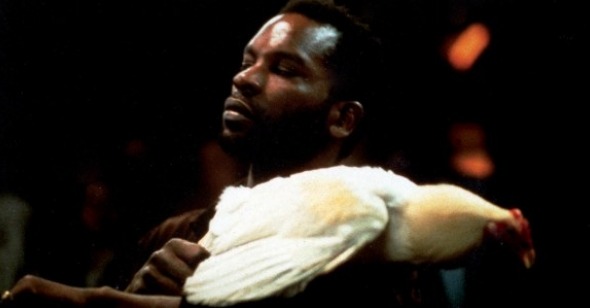Lost in Spaces
Nicolas Rapold on No Fear No Die
Running through No Fear No Die is a slender, serene thread: the bond between Dah (Isaach De Bankolé) and Jocelyn (Alex Descas), respectively a business frontman and an “expert” at raising and training roosters for the pit. West Indian émigrés, they work in the truck stop-and-byway outskirts of Paris for a preening restaurant-owner who is starting a cockfighting pit. De Bankolé is leonine and outgoing; Alex Descas is inward and lithe: when they walk side by side, they flow together, effortlessly attuned to one another. Content, they become looser and seem more alike; one night they stay up and chat about home on the bed rolls in the restaurant’s basement, where they sleep and train behind many doors.
Dah’s occasional voiceover frames the two together, spoken from the heart with the tough and tender familiarity of a friend, sensing any changes. The two friends glide in and out of strange landscapes. Inside: a roadside brasserie glimpsed only in parts, run by graying Ardennes (Jean-Claude Brialy), and named after his wide-mouthed girlfriend Toni (Solveig Dommartin); deeper down lies the cluttered below-deck space for the two men and the roosters. Outside: nowhere, felt more through a mid-volume highway hum than what’s seen—roads, a depot for trucks littered with crumpled cartons, overpasses, a turnoff where a black-market deal goes down as Dah and Jocelyn jog by. Across from the restaurant, up institutionally brutalist stairs, is a disused metal-machine disco where the fights happen in a fenced area that always seems tiny, shot first from spectator’s vantage and later as if we’re standing in the ring.
Between the buzz and shuffle of close quarters and betters’ circles, and the vanishing-point expanse of the roads, Jocelyn and Dah seem defined by displacement, even as sure and smooth as they are together. There does exist a good space, a freeness of movement, maybe well evoked by the gap opened by rhythm guitar on the “Buffalo Soldier” tape Dah pops in when they first join up. He uses the same tape when bothered by Jocelyn’s getting unmoored, “tripping out” and “losing heart” as the subtitles have it. (Jocelyn responds by dancing with the rooster he’s training, a sway oddly echoed later by his dance later in the disco with a confused but intrigued woman.) Denis quotes Frantz Fanon in interviews, about “colonized people feeling psychologically defeated even though they are physically free to determine their future,” and that sense of boundaries, within and without, is trenchant.
In the pit, halved red and green from wall to floor in medium shot, the cocks flare out face feathers and bound into splashy, deadening collisions; they start and stop, as the crowd heckles, then murmurs (in the always careful sound design). And maybe more than the inside-outside tension, this center-ring metaphor threatens to swallow up Jocelyn and Dah (and the movie) just as much; instead of acting as catharsis for average joes and second-rate grifters looking on, it is Jocelyn who’s drawn in by the end. In his decline, instead of launching his bird at a final match, he sits splayed in the ring, one sneakered foot stuck out, like a bird dropped from a great height. Yet in Denis’s hands, this resonance is not trumpeted (notwithstanding Dah’s “Men, cocks, same thing” and Toni-as-“uncaged hen” comments) for symbolism. The scene that was Denis’s seed idea, in fact, was Dah’s tenderly washing Jocelyn’s knifed body; when it occurs, he talks to his friend of home, recalling (even reprising) their bedtime banter, as if narrating a final trip back, into the heavenly idyll of an émigré’s memories—banana trees, grandpa and mother, coconut milk.
This may be the most touching moment in the film, but perhaps the saddest occurs through an earlier loss, the beginning of this absence—the moment we realize Dah’s voiceover has stopped, and is no longer phasing in and out of our experience of the film. We’ve heard the last of his/their thoughts sometime before the fateful final match (Ardennes’s spiteful son Michel stabs Jocelyn, who has lunged at Toni), and after Ardennes, whose racism and who’s-your-father jibes get blunter, has agitated for Gypsies to jazz up the fights with blades. Somehow, as Jocelyn breaks, the invisible grouping that Dah’s periodic commentary provides, the bond it reflects, drifts away. The last voiceover-like presence we hear is a murmured song as Dah approaches the ring (when a numbing disco thud is often also heard); it recurs in the final, sidelong shot of Dah being driven away, seemingly loose. (Jazzman Chocolat scorer Abdullah Ibrahim’s loping soundtrack then settles in over the credits.)
At the film’s beginning, Dah sits at the wheel of a car that breaches the darkness to reveal Jocelyn; at its end, he leaves as a passenger, visible behind shimmering reflections on a car window, drumming against the glass. The film’s original title, S’en fout la mort, might also be translated “To Hell with Death” (the release title introduces an unthought-out pidgin-English aspect), and there’s a sense that death has occurred earlier for his companion: something has seeped out of Jocelyn long before his final bloody match. At one point, Jocelyn flees the restaurant, necessitating Dah’s search into real Paris neighborhoods, through a building of dance studios and then a relative’s apartment, which he enters mid-family dinner—and though Dah packs Jocelyn into a car to fight again, there’s only so much he can do. It’s a scene familiar through much of Denis’s work—her sense for a bond, a loss absorbed, and a life continuing.
